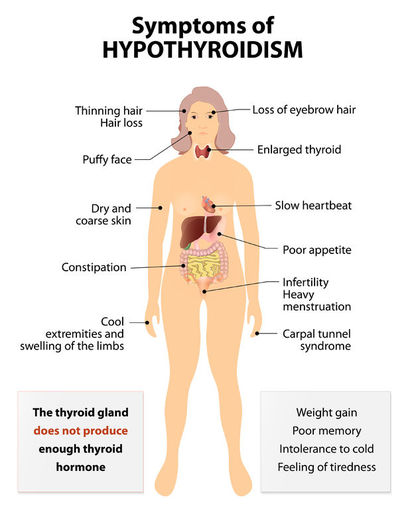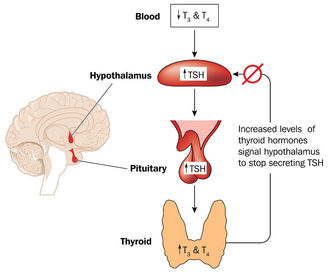 Many people come to me at my practice because they have difficulty losing weight and feel that their metabolism is slowing down. Your master gland for controlling metabolism in the body is your thyroid gland, a butterfly-shaped gland at the base of your neck. It is estimated that thyroid disorders affect 0.5-0.8% of the population, but those estimates may be on the low side. Naturopathic doctors such as myself who have taken additional training are now able to prescribe natural desiccated thyroid to help restore optimal thyroid function. Many people have been told that they have normal thyroid function after an initial screening test (TSH), but on further testing, one or both of their thyroid hormones are off. So, I usually screen my patients who experience several low thyroid symptoms with a full thyroid panel to make sure that their thyroid is functioning optimally. Symptoms of Hypothyroidism What are low thyroid symptoms? If you think about it, if your metabolism is slowing down, you will see repercussions throughout the body. Digestion will slow down, thinking will slow down, and the pounds will start adding up. Here is a list of common signs and symptoms of hypothyroidism: -Dry and coarse skin -Difficulty tolerating cold temperatures -Sluggish digestion and constipation -Slow thinking -Weight gain -Puffiness (you may notice puffiness in the face) -Slow heart rate -Delayed relaxation of ankle reflexes (this is tested during a physical exam) Having several of these symptoms does not necessarily mean that you have a thyroid issue. Many of these symptoms are non-specific, so they may be due to many other imbalances in the body. That’s why testing is so important. Testing for Hypothyroidism I usually do a full thyroid screen when I test for thyroid disorders, which includes: -TSH -fT4 -fT3 -TPO antibodies If you thought you had a thyroid issue or your doctor suspected it, you’ve probably had your TSH (thyroid stimulating hormone) tested. This hormone is secreted by the pituitary gland (at the base of your brain) and acts as a manager to tell the thyroid what to do. If the thyroid isn’t producing enough thyroid hormones, TSH will typically be high, as the manager is working hard, trying to get the thyroid to do its job. However, there is a huge “normal” range for TSH. If you’re within the normal range but still have symptoms, your levels may be sub-optimal. As a naturopathic doctor, I’m checking to see if you’re actually within the optimal range, which is a smaller sub-section of the normal range.
The next hormone to look at is your free T4 levels. This is a pro-hormone produced by the thyroid which needs to be converted to free T3. It’s the free T3 that is actually active within the tissues, speeding up your metabolism. If you’ve been taking Synthroid or its generic form, levothyroxine, you are getting synthetic T4. This T4 needs to be converted into free T3. However, many people take Synthroid, regain normal TSH and fT4 levels, but still have low thyroid symptoms because they are not converting the fT4 into fT3 properly. That conversion process depends on many things, including stress levels, heavy metal exposure, and minerals such as selenium and zinc. TPO antibodies are useful for screening for Hashimoto’s thyroiditis, an auto-immune condition where the body misguidedly attacks its own thyroid tissue, leading to hypothyroid symptoms. If you have this, it makes a big difference in how you will be treated from a naturopathic perspective, because our treatments will not only be aimed at getting thyroid function back, but also at decreasing the auto-immune response using diet, lifestyle, and supplementation. What Affects Conversion of T4 into T3? The conversion of T4 (inactive) into T3 (active) requires many factors to be in place for it to work optimally. The deiodinase enzyme is the enzyme through which this reaction takes place. This enzyme can be slowed down by (Hui, 2016): -Lack of progesterone (common as women enter perimenopause) -Low or high cortisol levels -Toxins and heavy metals such as mercury -Inadequate selenium, zinc, and other trace minerals and vitamins -Stress or many chronic diseases Why Desiccated Thyroid? Desiccated thyroid is not for everyone affected with hypothyroidism. However, now that you have a basic knowledge of how the thyroid works, you’ll understand why someone might require desiccated thyroid rather than Synthroid (only T4). Desiccated thyroid in Canada, called Erfa, is a standardized natural extract from a porcine source. Since it contains both T4 and T3, it can be especially useful for those who convert T4 poorly to T3. As well, since it is an extract of the whole thyroid gland, it also contains other nutrients that act as building blocks for the thyroid to function properly. In a randomized, double blind, crossover trial, when patients spent 12 weeks on Synthroid followed by 12 weeks on desiccated thyroid, or the other way around, 43% of patients preferred desiccated thyroid over Synthroid while only 19% preferred Synthroid (Hoang et al., 2013). Those on desiccated thyroid also tended to lose more weight. As with other drugs, patients on desiccated thyroid must be closely monitored to make sure that they are on an optimal dose for them which does not cause any side-effects. Is Desiccated Thyroid for You? If you would want to find out if desiccated thyroid is a good option for you, book an appointment at either of my locations, and I would be happy to help you out! We will do a thorough assessment and see if you would be a good candidate, or if there are other avenues that should be explored first (or in conjunction). If you think your health issues may be related to your thyroid, just give us a call! References Hoang TD et al. Desiccated thyroid extract compared with levothyroxine in the treatment of hypothyroidism: A randomized, double-blind, crossover study. J Clin Endo-crinol Metab 2013;98:1982-90. Epub March 28, 2013. Hui F. Clinical Pearls in Assessing & Treating The Thyroid. Evidence Based Nutrition Module 3: Bio-identical Hormones Conference. February 2016. Images from 123RF.com
2 Comments
7/9/2016 04:15:15 pm
Reverse T3 should be looked at also! It blocks T3 and prevents it from doing what it has to do!!!
Reply
7/17/2017 05:00:08 am
You do such a great job and you made a good site it very help us. I like your site and also I like your information. Thanks for sharing the best instructions they amazing and very nice things.
Reply
Your comment will be posted after it is approved.
Leave a Reply. |
AuthorDr. Tamar Ferreira is a Naturopathic Doctor in Brampton, Ontario. Her areas of focus include digestive health, hormone balance, and skin conditions. Topics
All
Archives
May 2020
|
118 Queen St. W., Suite 205
Brampton, ON
L6X 1A5
905-451-3963




 RSS Feed
RSS Feed